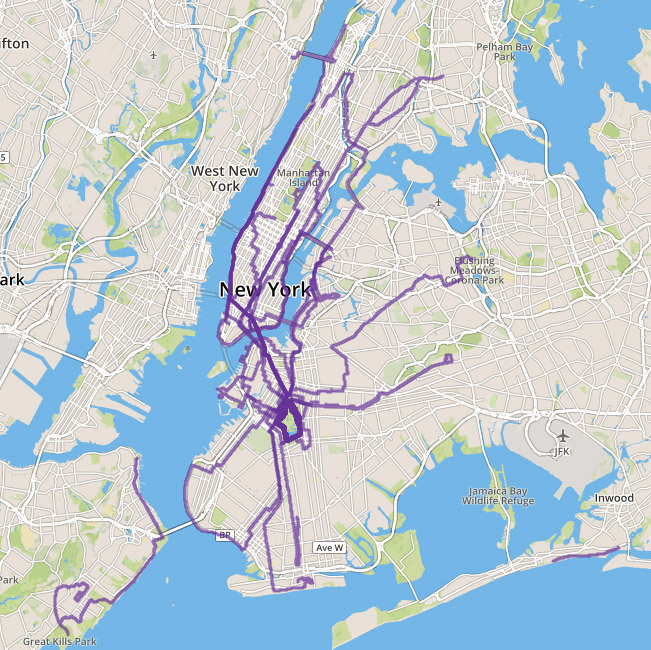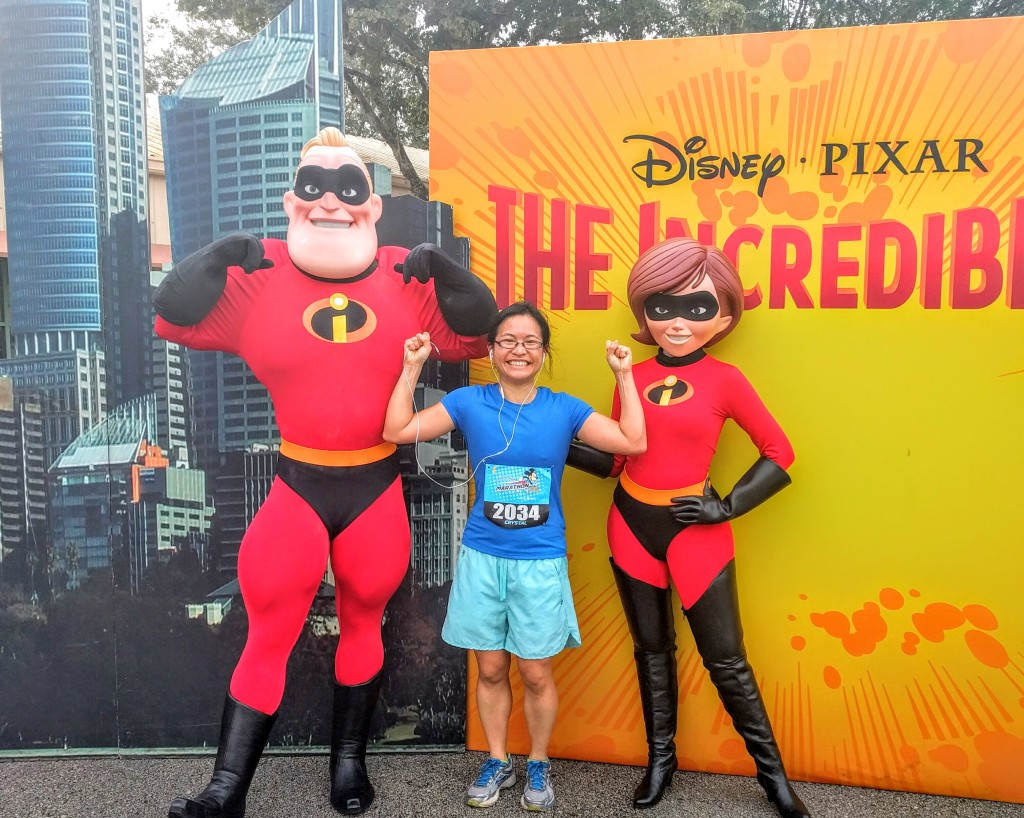“When you’re running… there’s a little person that talks to you and that little person says, ‘Oh, I’m tired. My lung’s about to pop. Oh, I’m so hurt; I’m so tired. There’s no way I can possibly continue.’ And you want to quit, right? That person… If you learn how to defeat that person when you’re running, you will learn how to not quit when things get hard in your life.”
– Will Smith
My general philosophy in life is to try to say yes, as much as possible (so long as it’s not something patently illegal or something I’ll obviously regret). Sometimes this leads me to faraway safaris in Sri Lanka. Sometimes this leads me to running in circles.
Back in late April, a friend said that he was going to sign up for a marathon, and asked if I wanted to do it too. Without thinking too much about it, I said yes. After all, I bike regularly, and go for a short run every week…er, month or so, how hard can running a marathon be? Step 1, you start running. Step 2…there is no step 2. Am I right??
So I logged into the Runkeeper account that I’d set up years ago and used once, and signed up for their beginner marathon training program. Four runs each week, with the first week starting with manageable 4 mile runs and a long run of 8 miles on Saturday. I added the next month’s running schedule to my Google calendar, highlighted in red, and tried really hard to either schedule activities on nights when I wasn’t running or shift runs to alternate days if I knew I’d be busy. Each week, I checked the weather and if conditions were challenging for running (thunderstorms), I would slot time in other parts of the day, like early mornings or late evenings. Sometimes I would end up skipping runs, but it would be anticipated and unavoidable, not due to poor planning.
In July, the furnaces hit New York, and running became a sluggish, molasses-paced crawl to the finish. I realized that switching my runs from late afternoons to early mornings would mean more tolerable running temperatures. The only problem was getting out of bed. I’d tried setting alarms in the past to get up early for a run, and had failed every time. This time though, I forced myself to go to bed earlier (10:30 pm at the latest) and when the alarm went off, I reminded myself that while getting up now was painful, running in the brutal summer heat would be even worse. So I’d best stop dawdling and get going.
By November, I had the opposite problem. Temperatures were dropping precipitously, and an ever-lengthening night meant that it was doubly difficult to pull myself out of bed when it was cold AND dark. I’d hit the snooze button once, sigh, then force myself into the chilly air, where no amount of layering could prevent my fingers from being numb after 120 minutes outside.
But I kept doing it. And every time, it got a little easier. Running a marathon, as it turns out, is less an accomplishment of physical training and more a feat of psychological endurance. While you can certainly push yourself to run until winded, for the most part, running a marathon requires a lot of long but slow runs, done at a comfortable pace where you can easily hold a conversation with someone. In other words, running is not the difficult part. The real challenge is the discipline to manage your schedule and get out of bed.
When Future You forces Present You to do smart things
Aside from the obvious necessity of training, the cornerstones of being a good runner are eating properly and getting enough rest. With my deep and profound love for bread, rice and pasta (I own a shirt that says “I <3 Carbs"), I was excited to eat plenty mac & cheese and pizza, until a particularly sluggish run after a saturated-fat laden meal convinced me that heavy foods were not the way to go. It was back to the tenets of a mostly plant-based diet for me: equal amounts of whole grains, vegetables and legumes, with occasional exceptions for cheese and meat. I was eating ridiculous quantities, but never felt the weight of a food coma. And the more I ran, the more my body got accustomed to the new training load, and I got used to running on an empty stomach and not feeling ravenous afterwards.
I’d say that I tried to temper my drinking, but that’s not particularly true. For the most part though, knowing that I needed to run the next morning forced me to go to bed a bit earlier, which stopped me from staying out as long.
What it’s like to be in incredibly good shape
I have never self-identified as being an athlete. Back in high school, my gym teacher used to sing “Eye of the Tiger” to me, in an effort to psych me up during volleyball games. I appreciated Ms. Caverly’s efforts at encouraging me, but still apathetically watched as the ball hit the ground a few feet away. Sports were for athletes, and I was a nerd on the Mathletes team. Enough said.
So, it’s a bit strange now for other people to be praising my athletic abilities. True, in the last few years, I’ve gradually been biking more and I’ve never been terribly out of shape. But when I ran a test race over the summer and placed high enough to be awarded an enormous cake, it was an odd feeling when other runners were patting me on the back and telling me how impressive my performance was. I realized I’m in the best shape of my life, easily in the top percentile for cardio stamina, and in better health than pretty much anyone else I know. I can hike a mountain, lift heavy boxes, sprint for an airport gate, sit straight with good posture, and walk all day without being tired.
About that last bit: The amount of energy that I have is kind of freakish. I’ve never slept a ton, but I’m now consistently sleeping less than I used to (around 6 hours) without feeling tired. Evidently, when you have the endurance and energy to go for a 20 mile run, but don’t, then you have all this extra energy on reserve for tackling the rest of life. It feels like a not-so-crazy superpower. Best of all, the extra time I have from not sleeping means I can learn another language, hone bread recipes, catch up with friends, and generally kick more ass at life.
Did I lose any weight? Quite a few people I talked to mentioned that weight loss was one of the reasons they started running. It makes sense; running burns calories faster than almost any other sport, except maybe cross country skiing. I felt I was at a healthy weight when I started, and for a little while, it seemed like I was gaining weight (1-2 lbs), possibly because I was going to town with eating everything I wanted, possibly because I was replacing fat with heavier muscle. The point is, weight is a number that doesn’t necessarily reflect how healthy you are. This is obvious when you think about it, but we usually don’t. It seemed clear to me that I was faster, stronger and feeling great, yet the scale was going up. At one point, someone asked how much I weighed and when I told them, they were surprised by the answer: “Wow, really? But you’re so skinny!” I felt sheepish, even though this is definitely something I shouldn’t worry about.
How to prevent boredom when you’re running for two hours
Let’s face it, running can be really boring, particularly if you’re at the gym running on a “dreadmill.” Some people asked if I have some sort of inspirational playlist to keep me going while running. I actually found that listening to music was detrimental because the beat screws with your body’s natural pacing mechanisms. Conveniently, I’d begun listening to podcasts (thanks, Serial!) and as I began running longer distances, I discovered new podcasts to fill the time. My podcast playlist now ranges from economics & big data (Planet Money, Econtalk, What’s the Point), to technology and entrepreneurship (Reply All, Start Up), to storytelling (This American Life, The Moth, Snap Judgement), to music theory (Switched on Pop), to cool things I didn’t know I wanted to know (Invisibilia, Radiolab, Surprisingly Awesome, 99% Invisible). I’ve gained a new appreciation for good audio reporting, feel like I’m better educated on many more subjects, and look forward to seeing a golden age in podcasting as a new generation of listeners comes on board.
The other tactic for fighting boredom is to change your scenery. I spent most of my time running in nearby Prospect Park, but made a point to explore new parts of NYC on my long, weekend runs. Oaxacan moles in Mott Haven? Triboro Bridge? Louis Armstrong’s house? It was actually a fun optimization problem to calculate where I could go for a given distance, what route to take given available shade/water fountains/traffic patterns, where the most convenient train stations would be for getting home, and what new restaurants I could try. Over the last 8 months, I’ve run more than the distance from NYC to Chicago, to neighborhoods, parks and beaches I didn’t even know existed, and I keep discovering unique and surprising corners of the city.
So you’ve run a marathon, what now?
On January 10, I ran the Walt Disney World marathon. I made some rookie mistakes and I was incredibly miserable by mile 22. But I kept moving and ended up finishing with an official time of 4:21:02, or 9:58 min/mile. I’m super thrilled to have this accomplishment under my belt, and am equally sure that I don’t want run another marathon ever again. The time and mileage required to train for a marathon just isn’t worth it at this point. But a friend just told me about the Broad Street race in Philadelphia (10 miles, all flat/slightly downhill, no turns) and it would be kind of nice to run a new PR for speed…
So, I’m shifting to running shorter, faster distances. That will be enough to keep me fit, add more variety to my runs (i.e. sprints), and free up my newfound time and energy to tackle other big projects.
Here’s to a new year of not-so-pedestrian adventures!
P.S. If you like running AND maps, I highly recommend CityStrides to visualize your routes.

